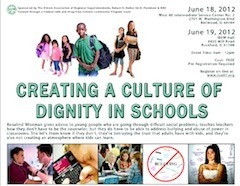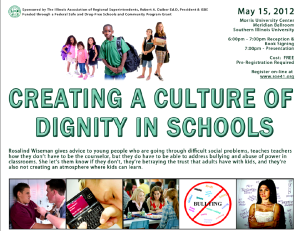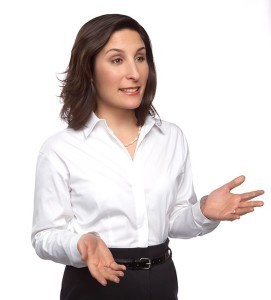Rosalind Wiseman's Blog, page 39
June 5, 2012
Rosalind Continues Her Illinois Workshop Series With Four More Sessions For Educators, June 18, 19, 20, 21.
 Rosalind will be presenting a series of workshops aimed at educators on Creating a Culture of Dignity in Schools. Organized by the Illinois Association of Superintendents of Schools, these workshops address many of the pressing issues facing educators today. Download flyer for Bellwood and Rockford by clicking here, or for Normal and Carterville by clicking here. You can also check our calendar for more details.
Rosalind will be presenting a series of workshops aimed at educators on Creating a Culture of Dignity in Schools. Organized by the Illinois Association of Superintendents of Schools, these workshops address many of the pressing issues facing educators today. Download flyer for Bellwood and Rockford by clicking here, or for Normal and Carterville by clicking here. You can also check our calendar for more details.
May 24, 2012
How to Avoid Taking the Bait When Your Kid Picks a Fight with You
Elijah, my 11-year-old son, woke up this morning determined to pick a fight with me. I know I should have been more mature, but I totally fell into his trap.
In my defense, it was a challenging situation. I’d just walked by the dryer and realized that he had put a pair of dirty underwear and socks inside to “clean” them.
So I may have said something like this: “Did you really put your dirty underwear and socks in the dryer without washing them first?” I also probably rolled my eyes as I was talking.
Elijah, of course, rolled his eyes in response (don’t know where he got that from) and declared, “Mooooom, I don’t have any clean clothes. I’ve looked evvverrrywhere.”
“Elijah, do you see the two laundry baskets at your feet?”
He glanced down and instantly came back with a classic defense: “But none of those clothes fit!”
From there our conversation deteriorated into a full-blown fight about his refusal to wear anything but gym clothes to school, while the problem of no clean underwear wasn’t being solved and it was 7:25. That meant he had 20 minutes to eat breakfast, feed the dog and sit on the couch reading a book while one or both of his parents yelled at him to get himself together.
I was really irritated.
Let me explain myself. I don’t expect either of my sons to wear uncomfortable clothes like a suit and tie to school—which Elijah accused me of when we argued. I don’t like wearing tight, scratchy clothes either. I only buy soft clothes for my sons that they approve of first because I don’t want to spend money on clothes they aren’t going to wear. So I have very limited patience when my son is moaning about how horrible it is to wear soft linen pants and collared cotton shirts.
This also isn’t a personal style thing where I’m forcing him to look a particular way. If he wanted to wear black skinny jeans with a weird geometric patterned shirt, I’d be totally fine with that. If he wanted to gel his hair so it stuck out, that’d be fine too.
But in the midst of my annoyance I had a parenting epiphany that immediately turned the tables on him.
“You know, Elijah, I really want to continue this argument but we can’t do it now. So let’s schedule this fight for later today when you get back from school, and we’ll have all the time we need. How about I meet you back here around 8 p.m. after dinner? Then you can show me how wrong I am, how horrible your clothes are and how none of them fit you.” I handed him some clean underwear from the laundry basket at his feet and went downstairs.
Scheduling the argument for later worked wonderfully. As promised, I walked into his room around eight that night and said, “You ready to continue our disagreement? Because now we have the time to fully resolve this issue.”
“Yes! Because I’m so right.”
“You’re going to have to prove that to me, because I spent a lot of money on those clothes and you agreed to them.”
“But that was only to wear once for that wedding in July we had to go!”
“The agreement for our argument was that you had to prove it to me. Put the clothes on.”
The clothes fit beautifully and they were comfortable. Even he had to admit it—not by actually saying so out loud, of course, but just the opposite. He didn’t say a word. Now my challenge was to not leap up in a victory dance, saying, “I told you so” or “You look so handsome in these clothes!”
All I said was “Thanks for trying them on.”
This is what I’m taking away from my experience: Don’t let your children put you in a bad mood, especially at the beginning of the day when you don’t have the time. If you catch yourself, solve the immediate problem and then schedule a time in the near future to discuss the overall problem.
Don’t wonder if your child is blind because he can’t see things right in front of his face. He can’t. Unless he really needs them to go out with his friends or play a video game.
And in a situation where you’re shown to be correct, don’t rub it in. The clean clothes are the reward.
First posted in Family Circle Momster.
How to Avoid the Bait When Your Kid Picks a Fight with You
Elijah, my 11-year-old son, woke up this morning determined to pick a fight with me. I know I should have been more mature, but I totally fell into his trap.
In my defense, it was a challenging situation. I’d just walked by the dryer and realized that he had put a pair of dirty underwear and socks inside to “clean” them.
So I may have said something like this: “Did you really put your dirty underwear and socks in the dryer without washing them first?” I also probably rolled my eyes as I was talking.
Elijah, of course, rolled his eyes in response (don’t know where he got that from) and declared, “Mooooom, I don’t have any clean clothes. I’ve looked evvverrrywhere.”
“Elijah, do you see the two laundry baskets at your feet?”
He glanced down and instantly came back with a classic defense: “But none of those clothes fit!”
From there our conversation deteriorated into a full-blown fight about his refusal to wear anything but gym clothes to school, while the problem of no clean underwear wasn’t being solved and it was 7:25. That meant he had 20 minutes to eat breakfast, feed the dog and sit on the couch reading a book while one or both of his parents yelled at him to get himself together.
I was really irritated.
Let me explain myself. I don’t expect either of my sons to wear uncomfortable clothes like a suit and tie to school—which Elijah accused me of when we argued. I don’t like wearing tight, scratchy clothes either. I only buy soft clothes for my sons that they approve of first because I don’t want to spend money on clothes they aren’t going to wear. So I have very limited patience when my son is moaning about how horrible it is to wear soft linen pants and collared cotton shirts.
This also isn’t a personal style thing where I’m forcing him to look a particular way. If he wanted to wear black skinny jeans with a weird geometric patterned shirt, I’d be totally fine with that. If he wanted to gel his hair so it stuck out, that’d be fine too.
But in the midst of my annoyance I had a parenting epiphany that immediately turned the tables on him.
“You know, Elijah, I really want to continue this argument but we can’t do it now. So let’s schedule this fight for later today when you get back from school, and we’ll have all the time we need. How about I meet you back here around 8 p.m. after dinner? Then you can show me how wrong I am, how horrible your clothes are and how none of them fit you.” I handed him some clean underwear from the laundry basket at his feet and went downstairs.
Scheduling the argument for later worked wonderfully. As promised, I walked into his room around eight that night and said, “You ready to continue our disagreement? Because now we have the time to fully resolve this issue.”
“Yes! Because I’m so right.”
“You’re going to have to prove that to me, because I spent a lot of money on those clothes and you agreed to them.”
“But that was only to wear once for that wedding in July we had to go!”
“The agreement for our argument was that you had to prove it to me. Put the clothes on.”
The clothes fit beautifully and they were comfortable. Even he had to admit it—not by actually saying so out loud, of course, but just the opposite. He didn’t say a word. Now my challenge was to not leap up in a victory dance, saying, “I told you so” or “You look so handsome in these clothes!”
All I said was “Thanks for trying them on.”
This is what I’m taking away from my experience: Don’t let your children put you in a bad mood, especially at the beginning of the day when you don’t have the time. If you catch yourself, solve the immediate problem and then schedule a time in the near future to discuss the overall problem.
Don’t wonder if your child is blind because he can’t see things right in front of his face. He can’t. Unless he really needs them to go out with his friends or play a video game.
And in a situation where you’re shown to be correct, don’t rub it in. The clean clothes are the reward.
First posted in Family Circle Momster.
May 7, 2012
Rosalind Teams Up with Illinois Superintendents on Creating a Culture of Dignity in Schools
 Rosalind will be presenting a series of workshops in coordination with the Illinois Association of Superintendents of Schools on Creating a Culture of Dignity in Schools. Events kickoff with community-wide presentations in May in Edwardsville and Chicago, and then continue with targeted workshops for educators and administrators throughout the state in June. Check our calendar for more details.
Rosalind will be presenting a series of workshops in coordination with the Illinois Association of Superintendents of Schools on Creating a Culture of Dignity in Schools. Events kickoff with community-wide presentations in May in Edwardsville and Chicago, and then continue with targeted workshops for educators and administrators throughout the state in June. Check our calendar for more details.
April 29, 2012
Family Circle: Ask Rosalind, May 2012
How do you guide your daughter when she starts using her natural leadership skills in ways you don’t approve of? Rosalind advises parents on this and other challenging dilemmas in the May issue of Family Circle.
It Takes a Village to Stop Your Child from Sneaking
 My sister Zoe is 27, has no children and lives a fabulous New York life. She’s visiting me in DC for a few days, and as I write this she’s sitting here wearing the most fabulous Patricia Field dark pink glittering pants that perfectly match the color of her hair—well, two segments of it anyway.
My sister Zoe is 27, has no children and lives a fabulous New York life. She’s visiting me in DC for a few days, and as I write this she’s sitting here wearing the most fabulous Patricia Field dark pink glittering pants that perfectly match the color of her hair—well, two segments of it anyway.
You may think that my sister, with her lack of parenting experience and fabulous pants, wouldn’t know how to hold her own with kids. That would be a mistake. Because Zoe knows my children will try to exploit every opportunity to get what they want.
Today she called me while watching my kids, and I was reminded of how cool it is when siblings provide crucial parental backup.
Zoe: Are they allowed to watch TV right now?
Me: Of course not. What did they say?
Zoe: I asked Roane (the 9-year-old), “Did you ask your parents if you could watch TV?” And he said yes. So I said, “Are you telling me the truth?” And you know what he said? “Do I have to be 100% positive about my answers?”
Me: He really said that?
Zoe: Yup. So I told him that while that was a very good answer and he’s very cute, I was calling you to find out.
It was a small moment, really insignificant in the larger scheme of things. But such moments teach my boys some very important things about the adults in their family: We’re no fools. We will and do talk to each other. And although we love them unconditionally, that doesn’t mean we believe them unconditionally.
Help Me With My New Book On Boys
 I’m writing a chapter on communication and why sometimes boys lie to their parents. If you have a son in 8th grade or above, please take two minutes to fill out this survey. Thanks!
I’m writing a chapter on communication and why sometimes boys lie to their parents. If you have a son in 8th grade or above, please take two minutes to fill out this survey. Thanks!
-Rosalind
April 9, 2012
AC360 Kids On Race: Why Telling Our Kids Racism is Bad Isn't Enough
Treat everyone the way you want to be treated.
I've never specifically talked to my kids about race but my kids know that everyone should be treated equally.
Unfortunately, these are the most common statements parents say about talking to their children about race.
I'm fully aware that people may read what I just wrote and think I'm out of my mind. In fact, I'd totally understand if you thought, "Why unfortunate? That's exactly what parents should be saying to their kids."
But the reality is that for most parents, that's all we say. We keep it general because we often don't understand or admit to ourselves our own feelings about race. So we believe we are imparting our values and that our children will turn around and value people equally regardless of race.
Well, the reality is a lot more complicated and uncomfortable, and if you watch Anderson Cooper's special Kids on Race you'll see what I mean. What the AC360 team did was empathetically but directly challenge all of us to confront the truth about what kids think about race. As the researchers they worked with showed, while we have made great improvements in reducing explicit racism, we have much farther to go to stop implicit racism: the biases we all have about people of different races.
AC360 asked Dr. Melanie Killen, a revered child psychologist and University of Maryland professor, to design and implement the study, help highlight and explain key findings and offer advice and explanations to parents who allowed their children to participate.
Specifically, the show investigates a concept known as "subconscious racial bias." This is described as "a bias that kids pick up on from messages they hear at school, at home, the characters in the TV shows they watch, what they see online." As Killen points, these are not overt feelings of racism, but rather "the things that we're not aware of, the things that we do when we don't realize it."
And acknowledging and understanding how those biases work is essential if we are truly committed to making our culture less racist.
No doubt this a very uncomfortable thing to do. Think about how awkward people get about even talking about race difference. Like when a young child describes an African American person as a black person and the parent shushes the child. Or when we are describing a person of color to someone else and we'll describe everything about them except one of their primary physical traits–the color of the skin. It's laughable except for the fact that those shushed children learn that there's something inherently so shameful about these people with darker skin that a physical characteristic can't even be named and dancing around a subject never gets us to authentic dialogue.
As I watched the show, I caught myself wondering how my sons would answer the questions the researchers asked the kids in the show. But what I am certain about it that even though I've talked to them a lot about race, I wouldn't be shocked if they answered like all the other kids and showed race bias against African Americans.
So tomorrow night my children will be very happy when I tell them they get to watch TV after they do their homework–and then we'll watch the show and discuss it over dessert. I don't want my children living in a race-blind society. I do want them living in a racism-aware society. Kids on Race is a great way to do help me do that.
How have you spoken to your kids about race? Share in the comments below.
*Originally published in Family Circle Momster
AC360 Kids On Race: Why Telling Our Kids Racism is Bad Isn’t Enough
Treat everyone the way you want to be treated.
I’ve never specifically talked to my kids about race but my kids know that everyone should be treated equally.
Unfortunately, these are the most common statements parents say about talking to their children about race.
I’m fully aware that people may read what I just wrote and think I’m out of my mind. In fact, I’d totally understand if you thought, “Why unfortunate? That’s exactly what parents should be saying to their kids.”
But the reality is that for most parents, that’s all we say. We keep it general because we often don’t understand or admit to ourselves our own feelings about race. So we believe we are imparting our values and that our children will turn around and value people equally regardless of race.
Well, the reality is a lot more complicated and uncomfortable, and if you watch Anderson Cooper’s special Kids on Race you’ll see what I mean. What the AC360 team did was empathetically but directly challenge all of us to confront the truth about what kids think about race. As the researchers they worked with showed, while we have made great improvements in reducing explicit racism, we have much farther to go to stop implicit racism: the biases we all have about people of different races.
AC360 asked Dr. Melanie Killen, a revered child psychologist and University of Maryland professor, to design and implement the study, help highlight and explain key findings and offer advice and explanations to parents who allowed their children to participate.
Specifically, the show investigates a concept known as “subconscious racial bias.” This is described as “a bias that kids pick up on from messages they hear at school, at home, the characters in the TV shows they watch, what they see online.” As Killen points, these are not overt feelings of racism, but rather “the things that we’re not aware of, the things that we do when we don’t realize it.”
And acknowledging and understanding how those biases work is essential if we are truly committed to making our culture less racist.
No doubt this a very uncomfortable thing to do. Think about how awkward people get about even talking about race difference. Like when a young child describes an African American person as a black person and the parent shushes the child. Or when we are describing a person of color to someone else and we’ll describe everything about them except one of their primary physical traits–the color of the skin. It’s laughable except for the fact that those shushed children learn that there’s something inherently so shameful about these people with darker skin that a physical characteristic can’t even be named and dancing around a subject never gets us to authentic dialogue.
As I watched the show, I caught myself wondering how my sons would answer the questions the researchers asked the kids in the show. But what I am certain about it that even though I’ve talked to them a lot about race, I wouldn’t be shocked if they answered like all the other kids and showed race bias against African Americans.
So tomorrow night my children will be very happy when I tell them they get to watch TV after they do their homework–and then we’ll watch the show and discuss it over dessert. I don’t want my children living in a race-blind society. I do want them living in a racism-aware society. Kids on Race is a great way to do help me do that.
How have you spoken to your kids about race? Share in the comments below.
*Originally published in Family Circle Momster
March 16, 2012
Stop Bullying: Speak Up
 If you've been looking for a good way to start a conversation about bullying with your child, this Sunday, March 18th at 5:30 PM (ET/PT) Cartoon Network will premier the film, Stop Bullying: Speak Up. I'm so proud to tell you about this project because I've been working behind the scenes on its development. In addition, I'll be answering questions from parents and kids online at www.StopBullyingSpeakUp.com during and after the show.
If you've been looking for a good way to start a conversation about bullying with your child, this Sunday, March 18th at 5:30 PM (ET/PT) Cartoon Network will premier the film, Stop Bullying: Speak Up. I'm so proud to tell you about this project because I've been working behind the scenes on its development. In addition, I'll be answering questions from parents and kids online at www.StopBullyingSpeakUp.com during and after the show.
President Obama will also give an opening statement to Stop Bullying: Speak up. Whatever your politics, it's so important that our children see our President speak out against bullying. I can truly say that when I heard Mr. Obama speak at the White House Conference on Bullying last March, it was clear that he cares deeply about this issue, not just as the President but as a father.
After the special, I hope you use the film as an on-going resource. To make that easier, Cartoon Network will post the special in its entirety on the website and you can see check it out on Xfinity, Facebook, iTunes and YouTube.com, for at least two weeks following the world premiere.
If you want to have a discussion with your child after you see the special, here are some questions to get you started.
Which children said things you agreed with? Why?
Which children said things you disagreed with? Why?
Do you agree with Matt Willhem's description of tattling or snitching and reporting?
Although it may not be easy, I also suggest paying particular attention to the section where the kids share experiences of telling their parents. It's always good to check in with your child to see how they feel about asking for help or telling you about a problem like bullying. Ask them if they have suggestions for how you can improve your reactions and make it easier for them to reach out to you. It's so important that our kids feel that they can share with us these difficult experiences and my sincere hope is that this film plays a small part in doing that.




